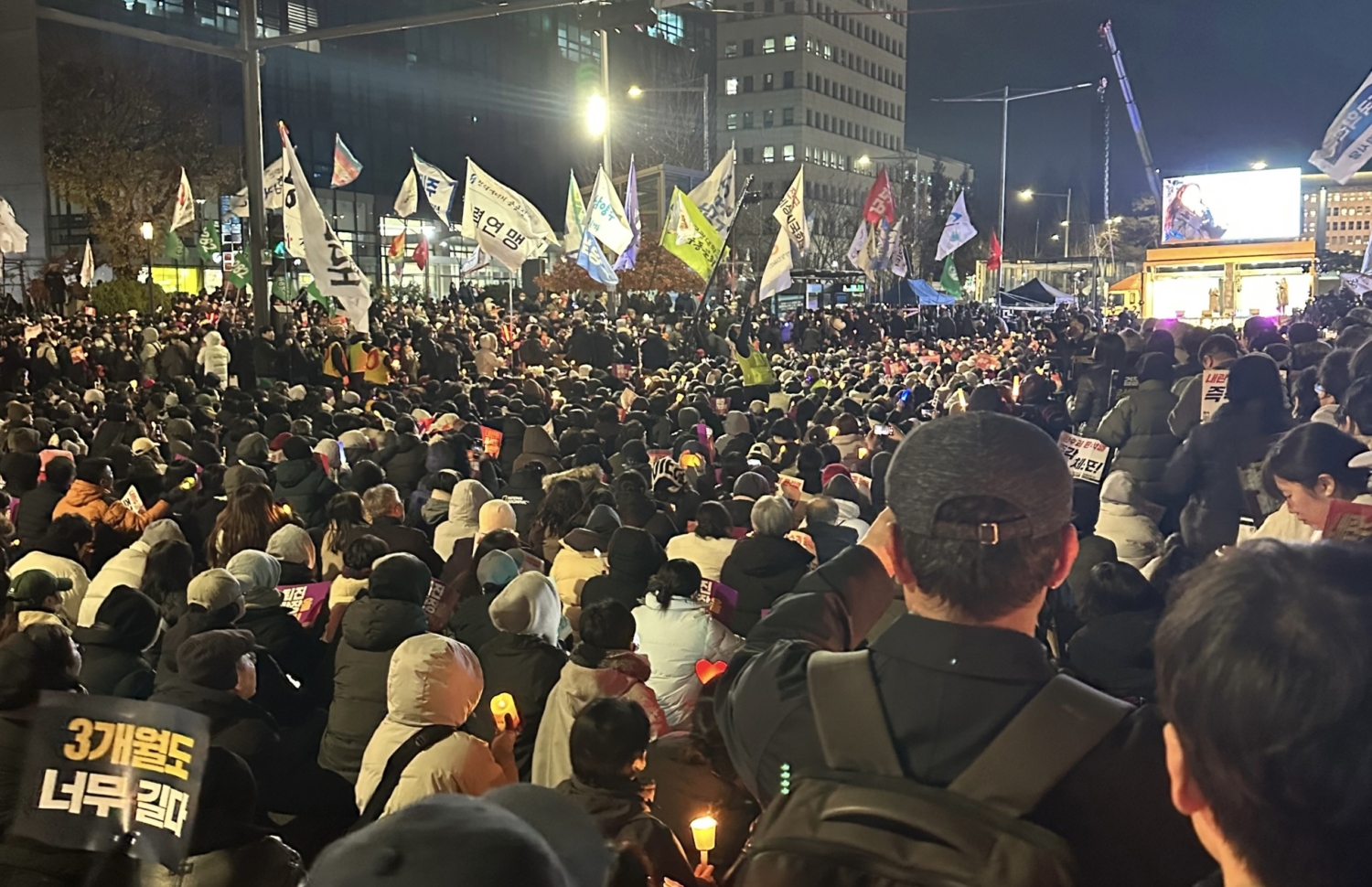South Korean unions fight for democracy
A conversation with Hyewon Chong, International Executive Director at the Korean Metal Workers Union, after the December declaration and reversal of martial law in South Korea
Willa Needham | January 6, 2025
Labor, workers and unions figured prominently into the social and political movements of 2024 from the U.S. Presidential Election to the recent protest movement to impeach South Korean President Yoon Suk Yeol after he declared martial law in December. During pivotal moments of political transformation and uncertainty around the world, labor organizations lead efforts to uplift democratic processes and resist injustice.
UCLA Institute for Research on Labor and Employment (IRLE) Associate Director Jennifer Jihye Chun sat down with Hyewon Chong, International Executive Director at the Korean Metal Workers Union (KMWU), in mid-December to discuss the KMWU’s response to the martial law declaration and the ensuing events. As we reflect on the tumultuous political events of 2024 and the anniversary of the January 6 insurrection in the U.S., we invite you to watch the full conversation below to learn more about Korean protest culture, worker mobilization and movement building.
On the night of December 3, 2024, South Korean President Yoon Suk Yeol declared martial law in a press conference, sparking outrage and massive protest actions throughout the country. The declaration was rescinded hours later, but its destabilizing effects have rippled into the new year as the situation continues to unfold.
A month after the short-lived declaration of martial law by now impeached President Yoon Suk Yeol, people continue to take to the streets daily in South Korea. The social and political turmoil will likely intensify as Yoon has publicly vowed to “fight until the end,” defying court-ordered arrest warrants and criminal prosecution. While there are troubling signs of intensified polarization in light of dramatic protest actions by pro-Yoon supporters, the country has been transformed by extraordinary scenes of solidarity, especially between workers and farmers that have fought for democracy for decades and a new generation of young women protesters chanting, singing and waving K-pop light sticks.
Organized labor was central to the immediate public response and mobilization effort following the declaration of martial law, with the Korean Metal Workers Union and the Korean Confederation of Labor swiftly calling for a “strike to defend democracy.” On December 5, at least 70,000 workers from major companies including Hyundai Motor, GM Korea and Hyundai Mobis joined the collective strike.
In the following conversation, co-moderated by IRLE Director Tobias Higbie, Hyewon Chong contextualizes the historical and cultural framework of the current moment in South Korea, explains the logistics of the tremendous worker mobilization and capacity building efforts in Korea and reflects on how labor unions support democracy and shape cultural narratives. Hyewon and Chun also provide their observations of the ongoing protest movement on the ground in Korea and discuss how the Korean labor movement has changed over time to include more women and workers in diverse sectors.
Speaker bios:
Hyewon Chong is the International Executive Director at the Korean Metal Workers Union. Hyewon has been active at various levels of the Korean trade union movement for over two decades. She worked at the enterprise level at Daewoo Motors, at the national level in the Korean Confederation of Trade Unions and at the international level in the International Metalworkers Federation, now the IndustriALL Global Union. Hyewon also served on a multistakeholder Advisory Group set up by the OECD Working Party on Responsible Business Conduct (WPRBC) and is active on Korean Transnational Corporations (KTNC) Watch. She has her MA in Sociology from Seoul National University and currently lives in Seoul.
Jennifer Jihye Chun is a scholar of Korean politics and the intersecting nature of gender, labor and nationality. As Associate Director of the IRLE, she leads the Transnational Gender and Labor Working Group, a joint research initiative between the IRLE and UCLA Center for the Study of Women (CSW). Her courses are regularly offered as part of UCLA’s labor studies program, and she currently serves as Chair of the International Development Studies (IDS) program at the UCLA International Institute. Chun is the author of the award-winning book, “Organizing at the Margins: The Symbolic Politics of Labor in South Korea and the United States” (Cornell University Press, 2009), and her forthcoming book, Against Abandonment: Repertoires of Solidarity in South Korean Protest (co-authored with Ju Hui Judy Han) will be released in June 2025.
Tobias Higbie is Director of the Institute for Research on Labor and Employment and professor of history and labor studies at UCLA. Higbie is a labor historian whose research explores the intersection of work, migration and social movement organizing in the United States.


